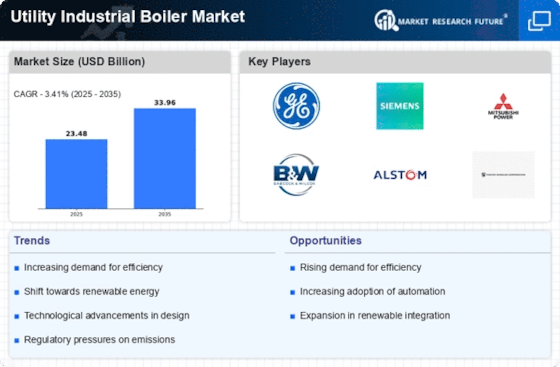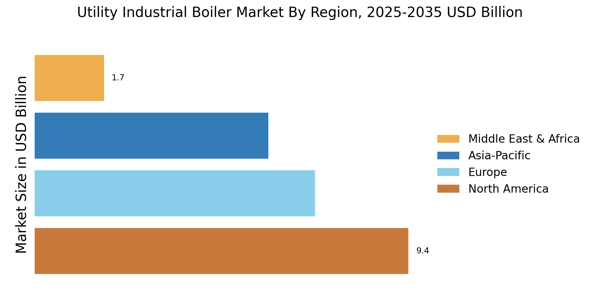Rising Energy Demand
The increasing The Utility Industrial Boiler Industry. As industries expand and urbanization accelerates, the need for efficient energy production rises. According to recent data, energy consumption is projected to grow by approximately 25% by 2040. This surge necessitates the deployment of advanced utility industrial boilers that can operate efficiently under varying loads. Furthermore, the transition towards cleaner energy sources is prompting industries to invest in modern boiler technologies that can utilize alternative fuels. Consequently, the Utility Industrial Boiler Market is likely to experience robust growth as manufacturers respond to this escalating demand for energy.
Focus on Sustainability
Sustainability initiatives are increasingly influencing the Utility Industrial Boiler Market. Industries are under pressure to reduce their carbon footprints and enhance energy efficiency. This trend is reflected in the adoption of boilers that comply with stringent emission regulations. For instance, many countries have set ambitious targets for reducing greenhouse gas emissions, which has led to a shift towards cleaner technologies. The market for utility industrial boilers that utilize biomass, waste heat recovery, and other sustainable practices is expanding. This focus on sustainability not only aligns with regulatory requirements but also appeals to environmentally conscious consumers, thereby driving growth in the Utility Industrial Boiler Market.
Technological Innovations
Technological advancements are reshaping the Utility Industrial Boiler Market. Innovations such as advanced control systems, improved heat recovery methods, and enhanced materials are making boilers more efficient and reliable. For example, the integration of artificial intelligence and machine learning in boiler operations allows for real-time monitoring and optimization, leading to reduced operational costs. The market is witnessing a shift towards modular boiler systems that offer flexibility and scalability. As industries seek to modernize their operations, the demand for these innovative solutions is expected to rise, further propelling the Utility Industrial Boiler Market.
Government Incentives and Support
Government policies and incentives play a crucial role in shaping the Utility Industrial Boiler Market. Many governments are implementing programs to encourage the adoption of energy-efficient technologies. Financial incentives, such as tax credits and grants, are being offered to industries that invest in modern boiler systems. This support not only reduces the initial capital burden but also promotes the transition to cleaner energy sources. As a result, the Utility Industrial Boiler Market is likely to benefit from increased investments in advanced boiler technologies, driven by favorable government policies aimed at enhancing energy efficiency and reducing emissions.
Industrial Growth and Infrastructure Development
The ongoing industrial growth and infrastructure development are significant drivers of the Utility Industrial Boiler Market. As economies expand, there is a corresponding increase in manufacturing and construction activities, which require reliable steam and heating solutions. The demand for utility industrial boilers is expected to rise in sectors such as power generation, food processing, and chemical manufacturing. Additionally, infrastructure projects, including transportation and utilities, are likely to create further opportunities for boiler manufacturers. This trend indicates a robust outlook for the Utility Industrial Boiler Market, as industries seek to enhance their operational capabilities through efficient boiler systems.

















